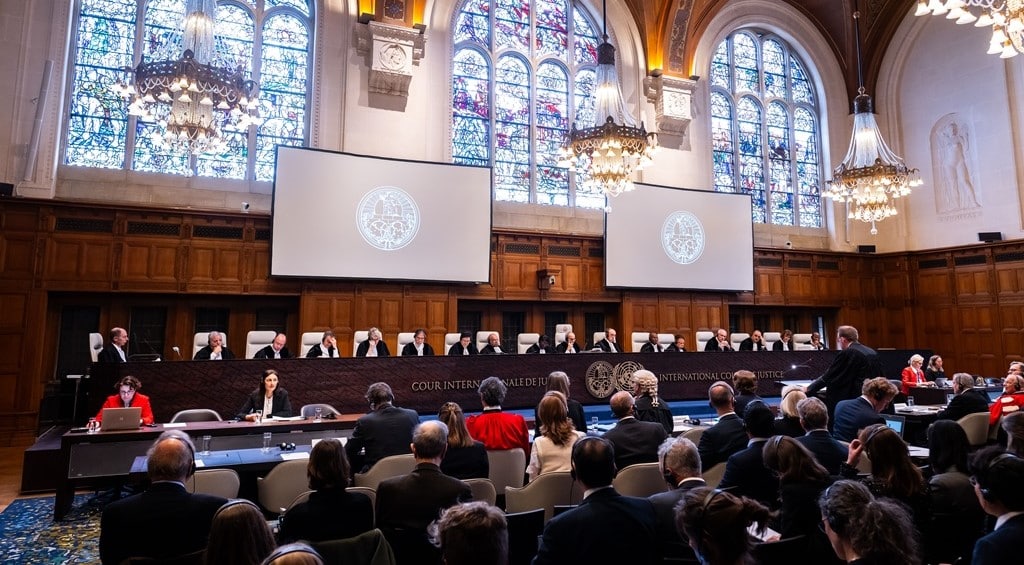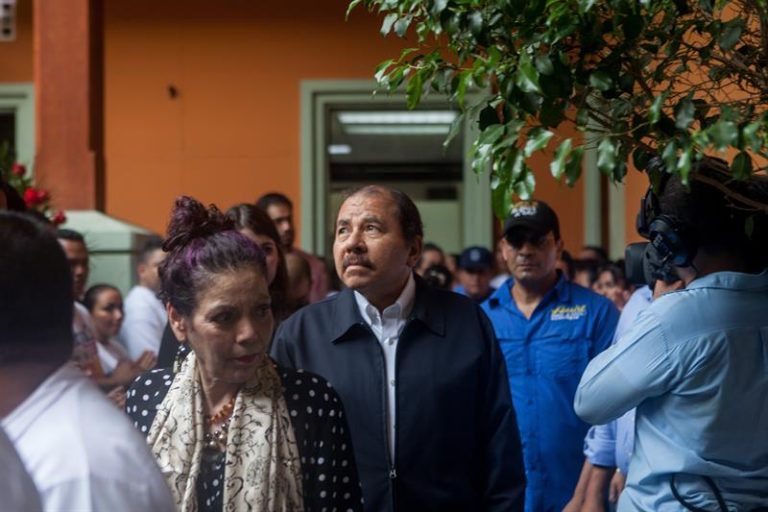1 de agosto 2017

ICJ Rules Against Nicaragua's Request For Germany to Halt Arms Sales to Israel

PUBLICIDAD 1M
PUBLICIDAD 4D
PUBLICIDAD 5D
At that point, further political victories for Ortega and his wife will surely require God’s grace

Daniel Ortega y Rosario Murillo en las honras fúnebres del excanciller y sacerdote Miguel D'Escoto. EFE/Douglas López.
SANTIAGO – On every other block in downtown Managua, massive billboards proclaim that, owing to God’s grace, “Years of Victory” are here. Aside from the Almighty, the purveyors of such victories are the larger-than-life President Daniel Ortega and his wife, Vice President Rosario Murillo, both duly portrayed with gaze fixed heavenward. Their creed, one reads, is “Christianity, Socialism, and Solidarity.”
That a socialist revolutionary – who first came to power after violently ousting the dictator Anastasio Somoza – should seek legitimacy in a Christian god is odd. Even odder is the relationship Ortega has forged with the local business community. Influential tycoons proudly report that the government consults with them on all economic legislation. Critics accuse business of “co-legislating” with the regime.
When the United States government recently caused a stir by claiming that foreign investors were being driven away from Nicaragua by influence peddling and arbitrary legal enforcement, José Adán Aguerri, the head of the leading business organization, Cosep, came to the government’s defense. If the US Embassy provided him with a list of foreign companies facing obstacles, Aguerri claimed, he would ensure that their problems were solved.
Downtown Managua has a park named after Salvador Allende, the Chilean socialist president ousted in a 1973 military coup, and a garish statue of the late Venezuelan strongman Hugo Chávez, portrayed in a yellowish hue that makes him look like Bart Simpson. To say that property rights are not fully secure in Nicaragua is an understatement. The judiciary does not stray far from Ortega’s wishes, and public administration is widely viewed as corrupt.
In 2015, Nicaragua ranked in the 28th percentile in the World Bank’s Rule of Law index, meaning that 72% of countries did better. On control of corruption, Nicaragua ranked even lower, in the 19th percentile.
Yet, with inflation under control and the economy growing at a steady 4-5% pace in recent years, the private sector looks and acts happy. An abundance of cranes in Managua suggests a boom in office construction.
Since Ortega reclaimed the presidency in 2007 (he had left office in 1990 after losing an election to Violeta Barrios de Chamorro, and lost presidential elections in 1996 and 2001), his regime has steadily slid toward authoritarianism. In 2009, a Supreme Court he had packed with allies allowed him to circumvent term limits and run for president again. Since then, the National Assembly, which Ortega dominates, has granted him the right to seek an indefinite number of terms.
Before the national election last November, the Supreme Court did him another favor, barring Eduardo Montealegre, the main opposition leader, from participating. Ortega was reelected with 72% of the vote. No one is sure of turnout (official numbers are unreliable), but independent observers estimate that as many as two thirds of voters stayed home.
The regime’s authoritarian tendencies have not gone unnoticed internationally. A bill currently progressing through the US Congress would impose sanctions on Nicaragua if Ortega does not move to restore democratic freedoms and stem corruption. If enacted, US representatives would be instructed to vote against loans to Nicaragua from all multilateral lenders, and the US government would have to compile and publicize a list of corrupt Nicaraguan officials.
The combination of socialist rhetoric and business-friendly corporatism is mostly new to Latin America. There was some in Ecuador under President Rafael Correa, who recently stepped down after three terms in office. But one has to turn to Asia – Vietnam and China come to mind – to find a similar combination.
Yet Ortega’s model looks much less sustainable than that of Asia’s putative socialists. Vietnam has based its growth on rapid industrialization, enabled by integration into a regional value chain centered in China. Nothing of the sort has happened in Nicaragua. The country remains dependent on natural-resource-based exports: beef, sugar, coffee, and a bit of mining.
The Dominican Republic-Central American Free Trade Agreement has provided only a weak boost for new exports. Unlike neighboring Costa Rica, Nicaragua has no high-tech industry. And maquila (assembly and re-export) activities are much sparser than in El Salvador or the Dominican Republic, let alone Mexico. In the Atlas of Economic Complexity compiled by Harvard Kennedy School researchers, Nicaragua ranks 106th out of 124 countries.
That is one reason to be skeptical about the sustainability of Nicaragua’s recent economic growth. Another is the disappearance of Venezuelan aid. No one is sure how much money the Venezuelan regime pumped into Nicaragua, but one hears estimates from reputable sources of around $500 million a year for nearly a decade.
That is a lot of money in a country with a GDP of barely $13 billion. It allowed Ortega to stimulate the economy while buying support from key constituencies. But with Venezuela’s economy in free fall and the country sliding into political chaos, such largesse has ended.
Nicaragua’s recent economic growth plausibly owes much to a phenomenon that would be familiar to the Vietnamese: low-income countries that achieve a modicum of macroeconomic stability often experience a growth spurt. In relatively backward economies, where “everything remains to be done,” it is easy, early on, to spot profitable investment opportunities.
But the law of diminishing returns eventually kicks in. Once the basics of a consumer economy are in place, sustaining high returns requires developing new products, building new sectors, and penetrating new markets.
That has proven hard to do even in Latin American countries like Chile, endowed with strong institutions and an established rule of law. It will prove even harder in a country like Nicaragua, which is relatively short of human capital and governed by what the University of Chicago’s James Robinson and MIT’s Daron Acemoglu call extractive (as opposed to inclusive) political and economic institutions.
So, an economic slowdown is likely sooner rather than later. At that point, local business leaders will feel rather less proud of their cozy relationship with an authoritarian government. And the government will find it much harder to secure a restive population’s quiescence. At that point, further political victories for Ortega and his wife will surely require God’s grace.
Andrés Velasco, a former finance minister of Chile, is Professor of Professional Practice in International Development at Columbia University.
Copyright: Project Syndicate, 2017.
www.project-syndicate.org
PUBLICIDAD 3M
Economista, académico, consultor y político chileno. Fue ministro de Hacienda durante todo el primer gobierno de Michelle Bachelet (2006-2010). Es director de Proyectos del Grupo de Trabajo del G30 sobre América Latina y Decano de la Escuela de Políticas Públicas de la London School of Economics and Political Science. Sus textos son traducidos por Ana María Velasco.
PUBLICIDAD 3D